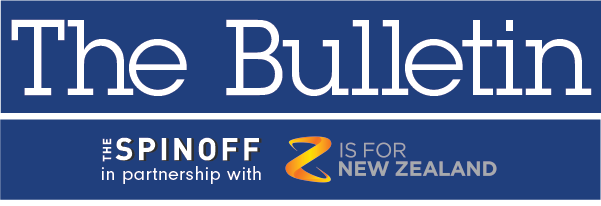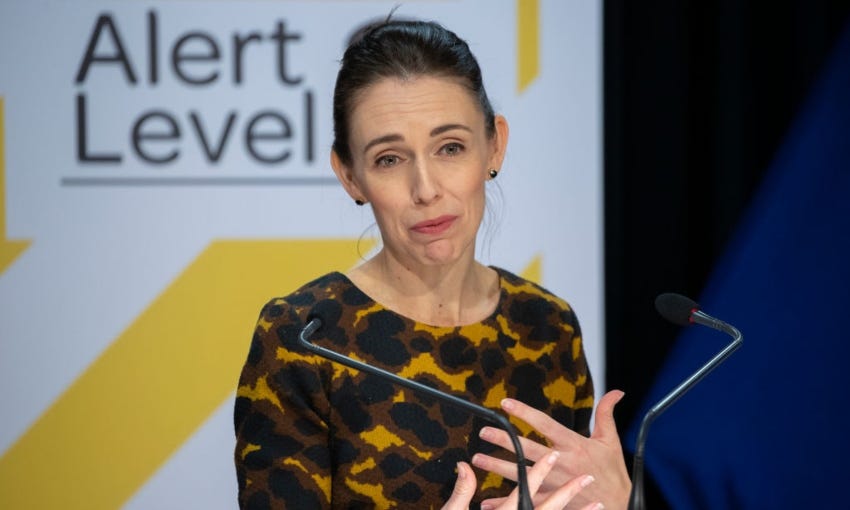Clarifying the rules of Level Two
We're getting into a much more complex system, and there are some signs of strain.

Good morning and welcome to The Bulletin for Tuesday 12 May, by Alex Braae of The Spinoff. Presented in partnership with Z Energy.
In today’s edition: Level Two is coming but some of the rules have changed, Work and Income could be facing class action suit, and China issues strong warning to NZ over Taiwan.

(Getty Images)
So we got the announcement yesterday – we will be moving to alert level two this Thursday. The decision was outlined by PM Jacinda Ardern at yesterday afternoon's press conference – I'll link to her speech here, but let's be honest, hundreds of thousands of people around the country were watching it live anyway. It's a very big moment in the overall fight against Covid-19, and as Toby Manhire reports, it will take place in a phased process – for example, schools and early learning centres won't open again until Monday next week.
The relative simplicity of level three and four is now being replaced with something a lot more complicated, in that it is a system designed to allow people out and about again while still maintaining a safe level of distancing. Perhaps because of that complexity, some of the rules of level two are changing before our eyes. That has always been a possibility since the alert level system was announced – there has after all always been room in them for tinkering. For example, the original level two limited regional travel, a restriction which has now been eased up. But some of the recent changes have caused genuine confusion, and will have a real impact on people's lives.
For starters, the limits on gatherings: Last Thursday, I reported on a press conference in which it was announced that social gatherings would be capped at 100 people. Now they're being capped at 10, for pretty much everything you could think of. That includes events like weddings and tangi, and the Funerals Association has condemned that reversal as "cruel and harsh." The justification from the PM is that with bubbles slowly being opened up, it is safer at this stage to continue to limit the number of contacts each person has. She also said the government was hearing those concerns, and that the rules would be reviewed in two weeks.
Then there was the announcement that bars would not be allowed to open until Thursday next week. It made sense, because the drinking side of social life inevitably carries a lot more risk of passing on a virus. Then it was clarified in a press release from minister Kris Faafoi, just hours afterwards, that bars would actually be able to open on Thursday of this week provided patrons are served a meal – basically, the exact same rules that restaurants are under. This might seem like playing with semantics, or just a question of where the emphasis is, but it matters, because venues that break the rules could end up being shut down.
Thirdly, there was a somewhat odd (and totally unenforceable) suggestion on the government's Covid response website that private social gatherings would be limited to two hours. That also got clarified – there isn't a time limit on private gatherings, reports Stuff. But as One News reports, some gatherings will still have the two hour time limit in place, along with the 10 person limit.
For some, these will all be small things. But for others, they'll be huge, and the changes will seriously disrupt what they would have otherwise been planning. And it cuts against something that has been a real strength in the country's response so far – the clarity of communication and messaging coming out of the government in getting people to buy into the reason for the restrictions. It may well be that such clarity is no longer possible, as we get into the more nuanced world of the lower alert levels. Hopefully we're all ready for that.
Of course, the most important messages are staying the same. Stay at home if you feel even slightly sick. Practice physical distancing when you're out in public. And make sure you keep on washing those hands.
From the Friday files: Our second piece in this series concerns some of the nuggets of detail around repatriation flights. It's published on Yahoo, and is by Australian Associated Press (AAP) journo Ben McKay. There are the main facts of course – how much is being spent on the flights, how many Kiwis have been brought home, and the massive effort at MFAT that has been put towards the programme. But among the other stuff, there is an odd detail about higher risk countries being targeted for repatriation flights, which is fair enough – it's just that it's less clear about when flights from countries that are lower risk will be happening, if at all, which could leave some New Zealanders overseas stuck.
By the way, thanks to everyone who has made a suggestion so far for this series – keep them coming in to thebulletin@thespinoff.co.nz
Questions about Work and Income allegedly denying benefits to those made redundant continue to swirl. Radio NZ's Glen Scanlon reports the organisation has been contacted by many others in a similar position since the story broke, and there are now suggestions that the best remedy for the issue might be a class action lawsuit. The scale of this is potentially pretty staggering – there could be literally thousands of people in line for compensation payments. Late in the evening, there was another update from Radio NZ – minister Carmel Sepuloni has stepped in and ordered an investigation "to ensure MSD practice reflects the legislation". Of course, for those who suffered at the time as a result of these unlawful alleged practices, that might not be much comfort.
China has sent a strong warning to the NZ government over advocacy for Taiwan at the World Health Organisation. The backstory to this was covered last week – and the latest update can be found as the most recent entry in yesterday's live news blog. The Spinoff received a transcript of the briefing from Chinese foreign ministry spokesperson Zhao Lijian from a source, and it's pretty strident language. I'll quote at length so you can see what I mean:
“The remarks on the Taiwan issue severely violate the One China principle. We firmly reject and deplore it. We have lodged stern representations.”
Zhao Lijian added: “The talking up of any suggestion of participation by the Taiwan province in the WHO and the World Health Assembly mask a true intention of seeking independence under the pretext of the virus.” It was a “thoroughly political manoeuvre” by Taiwan. “We urge the New Zealand side to abide by the One China principle and stop its wrong deeds and words on the Taiwan issue, so as to avoid undermining our relations.”
A woman who arrived from the US has tested positive for Covid-19, after spending more than a week quarantining in an Auckland prison. Radio NZ reports she was held there after initially refusing to take a Covid test – she had no contact with other prisoners in that time, and staff around her wore full PPE. Corrections has not yet made it clear whether staff who came into contact with her have been tested.
One of the weirdest media stories of the year played out yesterday through the medium of articles on major news websites, and the NZX announcement board. Duncan Greive has covered the announcement by NZME that they wanted permission to buy Stuff for $1 – Stuff's parent company Nine responded by saying they had terminated negotiations with NZME last week, before NZME hit back again by saying they still felt they had exclusive negotiating rights. The final word came from Stuff – they published this story late in the day noting that NZX regulators had been in touch with NZME about their original statement. There was also the alarming suggestion in this Business Desk (paywalled) column, that Nine could be mere weeks away from closing Stuff down, which would be a nightmare scenario for journalism in this country.
There are some strange goings on in the Manurewa branch of the Labour Party, where the incumbent MP Louisa Wall might end up being ousted. Newsroom has reported on the selection battle, in a seat so safe that the party's candidate is effectively assured of becoming an MP. The latest development is that the saga might end up in court, over the acceptance of a late nomination from the challenger – current Waitematā DHB board member Arena Williams.
Got some feedback about The Bulletin, or anything in the news?
Drop us a line at thebulletin@thespinoff.co.nz

Right now on The Spinoff: Peter McKenzie writes about creative ways for climate activists to push on, at a time when mass gatherings are dangerous. Andrew Geddis updates the situation with the arguments about whether the lockdown was legal – don't worry, it's written in a way in which lay people like myself can understand. Alice Webb-Liddall writes about the world's largest refugee camp, and the people trying to prevent an outbreak. Mark Thomas writes about sustainability and why the rebuild needs to prioritise it. Jean Teng writes about the campaign to delete Uber Eats, and whether there's anything better to replace it with. Nessa Lynch and Yvette Tinsley write about the wait times for jury trials, and the likelihood for them to blow out. And we've just published an excellent piece on coronavirus and contrarianism by Danyl McLauchlan, himself a writer who is no stranger to arguing his corner against the popular point of view.
For a feature today, a long read about the guy who makes things happen if you want to do business with North Korea. Bloomberg has profiled Alejandro Cao de Benós, a Spanish businessman with close ties to Pyongyang, who can make or break investments in the closed off society, and acts almost like an unofficial ambassador. If you're like me, you'll spend much of the article wondering if he's for real, or has just found a lucrative niche. Either way, here's an excerpt:
He has only honorary citizenship in the country, he says. To become a North Korean citizen, Cao de Benós would have to renounce Spain, which would mean giving up a free life on the Spanish coast and moving to the world’s most closed-off country. This isn’t a dealbreaker for him.
“It’s what I wanted since I’m 13,” he says, over a plate of vegetable paella (Cao de Benós is vegetarian) in Tarragona’s old quarter, during one of three days’ worth of conversations in which he rhapsodizes about the famously brutal and authoritarian regime. That’s when he read about North Korea’s particular—in his view, pure—form of socialism and fell in love.
At 16, he flew to Pyongyang, having saved up for the flight by working at a gas station. “I found a very clean society with very nice people,” he recalls. “And then, I made up my mind: I want to help Korea.”
Netball. Rugby. They're both coming back, and I'm struggling to contain my excitement. The NZ Herald reports the ANZ Premiership will resume as a 10-week competition on June 19, and Super Rugby Aotearoa will launch a week earlier with the five local franchises. Neither will be played in front of crowds of course. But the return of both will be a massive boost for Sky Sport, which (given that it also holds NRL rights) will suddenly have close to a full slate of programming.
That's it for The Bulletin. If you want to support the work we do at The Spinoff, please check out our membership programme




